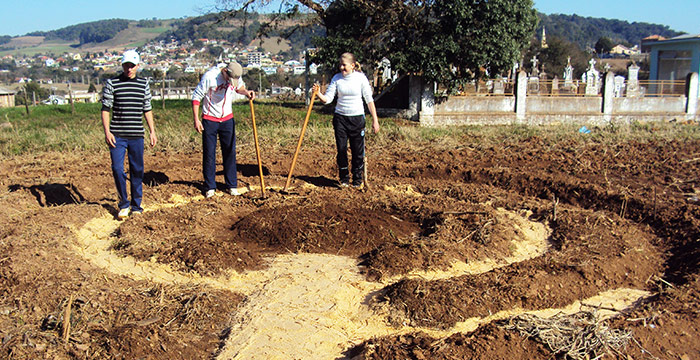
Brazil, South America
Landcare training
Encouraging school & rural life
ARISE coordinators in Arroio do Tigre, Brazil, held broad discussions with community leaders and together they developed the local Model Farm School course. The main purpose of the training is to teach young people technical landcare skills, and to make school a more attractive option than working in tobacco fields.
In Arroio do Tigre, as in most rural areas of Brazil, many young people seek to leave the family home and head for the city because working in a supermarket or a factory is considered easier than working on a farm. This school of thought motivated ARISE coordinators to hold broad discussions with local leaders and to develop the local Brazilian version of the MFS training course. The main purpose of the course is to teach young people technical agricultural and environmental conservation skills, and to make school a more attractive option than working in tobacco fields. Participants are made aware that they are not permitted to work on tobacco fields before the age of 18, but they can learn farming techniques that they can later apply to diversify production on their own family farms. Whilst attending the course, many of the children asked for space on their family properties so that they could practice what they learned in the course. Some created tomato demonstration units, some farmed earthworms, and others planted gardens with medicinal plants around their homes.
One of the course participants was Raul Pinto, 14, who attends the EMEF Jacob Diesel School in Coloninha. Raul put several of the lessons he learned into practice by creating a tomato demonstration plot behind a shed on a small piece of land given to him by his grandfather. He created the seedbeds, transplanted the seedlings to the field when they were ready, and cared for the plants as they matured. The production was a success and Raul no longer mentions leaving to work in the city when he is older.
Another enthusiastic student is Henrique Hammerschmitt, 16, from São Roque. Henrique also attended the MFS course in 2013 and soon wanted to experiment and to demonstrate to his family what he had learned. Henrique was fortunate enough to be able to use a small area of land behind the family home to grow a few types of green vegetables. The success of this first experiment encouraged Henrique’s father to consider diversifying the property’s production. When Henrique had completed the course, he showed his father how to plant carrots and beetroot. They also planted 100 tomato plants around the house and they now sell them to neighbors. The tomatoes that are not visually appealing are turned into concentrate and frozen for family use during the winter. Henrique’s family is supportive and encourages him to continue his practice and stay in the rural area. His grandmother has even promised him a plot of land for him to grow fruits and greens in the future.
Interestingly Henrique’s mother Romilda also took a baking course coordinated by ARISE, and she now bakes 10 loaves of bread for the same customers every Wednesday. She cannot increase her production due to lack of space but the additional family income is highly welcome.
The new skills learned by the adolescents and parents alike provide new and varied sources of income for the families, which permits them to employ help at harvest time so that child labor is not used. At the same time it encourages the children to stay in school and to stay in rural areas.




